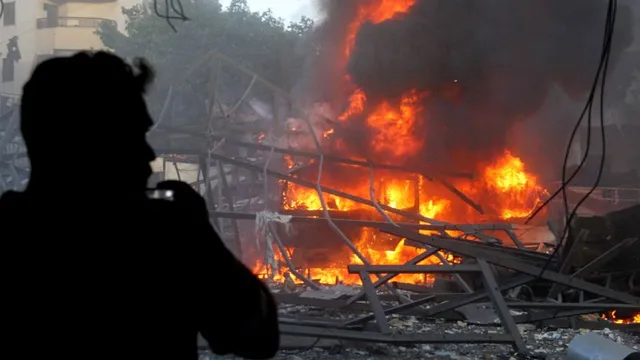
Israeli jets launch third strike on Hezbollah in Beirut's suburbs
2025-04-28 19:42- Israeli jets targeted a Hezbollah missile storage facility in Beirut's Hadath area on April 27, 2025, issuing an evacuation warning beforehand.
- This was the third strike since a ceasefire came into effect in late November 2024, with prior incidents resulting in multiple casualties.
- Lebanese officials have condemned the strikes as a threat to regional stability and have called for international intervention to uphold the ceasefire.
Express your sentiment!
Insights
On April 27, 2025, Israeli jets conducted an airstrike in Beirut's southern suburbs, marking a recurring incident since the ceasefire began in late November 2024. This strike followed a prior warning issued by the Israeli military about targeting Hezbollah facilities, specifically a missile storage site in the Hadath area. The strike created panic among residents, who were urged to evacuate the vicinity to avoid potential casualties. The Israeli military reported no immediate casualties but identified that their actions aimed to disrupt militant activities linked to Hezbollah, which they view as a significant threat in the region. Previously, two other strikes occurred on March 28, 2025, and April 1, 2025, with the latter resulting in the deaths of four individuals, including a Hezbollah official. This pattern of strikes speaks to Israel's ongoing conflict with Hezbollah, reflecting historical tensions that have included significant military engagements. In a response to the latest attack, Lebanese President Joseph Aoun condemned the strikes, calling on the United States and France to intervene to prevent further escalation and uphold the ceasefire agreement. His statements indicate a broader concern regarding the stability in Lebanon and the risk of renewed violence that could resonate throughout the region. The situation has drawn reactions from international figures as well, such as U.N. Special Coordinator for Lebanon Jeanine Hennis, who stressed the risks associated with undermining the ceasefire. According to reports, the continued Israeli military actions following the ceasefire have resulted in the deaths of at least 190 individuals in Lebanon, highlighting the escalating violence and resulting humanitarian crisis these strikes have triggered. Moreover, leaders from Hezbollah, including Sheikh Naim Kassem, have warned of potential retaliation if Israeli incursions persist and if the Lebanese government fails to act against them. Kassem emphasized that Hezbollah would not disarm unless Israeli forces withdrew from southern Lebanon and ceased airspace violations, pointing to the persistent unwillingness from both parties to de-escalate tensions. As the region remains precarious, these military strikes illustrate the fragile state of ceasefire agreements and the ongoing struggle for power and security within Lebanon and its border with Israel.
Contexts
The history of the Israel-Hezbollah conflict is a complex narrative characterized by long-standing political, religious, and territorial disputes. It primarily dates back to the late 20th century, following the establishment of Israel in 1948 and the subsequent Arab-Israeli conflicts. Hezbollah, a Shiite militant group, emerged in Lebanon during the early 1980s amid the Lebanese Civil War and Israeli invasion of Lebanon in 1982. Initially supported by Iran, Hezbollah aimed to resist Israeli occupation, liberate southern Lebanon, and establish an Islamic state. The group gained popularity and legitimacy among Lebanese communities by providing social services, as well as by its military actions against Israeli forces in Lebanon, culminating in the withdrawal of Israeli troops from southern Lebanon in 2000. The conflict saw several significant events, including the 2006 Lebanon War, which was sparked by Hezbollah’s cross-border raid into Israel, resulting in the abduction of Israeli soldiers. The ensuing month-long war involved intense aerial bombardments by the Israeli military and rocket attacks by Hezbollah into northern Israel. This conflict resulted in considerable casualties and infrastructure destruction, deepening animosities on both sides. Although a United Nations ceasefire ended the hostilities, underlying tensions continued, with sporadic skirmishes and border incidents, thereby perpetuating an atmosphere of conflict. In more recent years, the dynamics of the conflict have shifted with the Syrian Civil War. Hezbollah has committed significant resources to support the Assad regime in Syria, which has further complicated its relationship with Israel. Israel views Hezbollah's military buildup and involvement in Syria as a direct threat and has conducted numerous airstrikes against Hezbollah positions and arms shipments in Syria. At the same time, Israel has sought to strengthen ties with other regional players and established relations with several Gulf States, indicating a changing geopolitical landscape that could influence the Israel-Hezbollah conflict. The Israel-Hezbollah conflict remains unresolved, marked by deep ideological divides and ongoing hostilities. While both sides have engaged in occasional negotiations and ceasefires, lasting peace seems distant. Factors such as Iran's influence over Hezbollah, the political instability in Lebanon, and Israel's security concerns ensure that the conflict continues to be a focal point of tension in the Middle East, with wider implications for regional stability and international relations.